
Table of Contents
- Search Engine Optimization (SEO): Learning The Basics
- On Page SEO - Analyze Your Website
- How To Do Keyword Research for SEO
- Off-Page SEO: What Is It & How TO Use It TO Your Advantage
- The Ultimate Guide to Technical SEO
- PracticeBeat: Your Comprehensive SEO Audit
Search Engine Optimization (SEO) is an essential part of any digital marketing strategy. If a healthcare practice is not utilizing SEO correctly, they could be missing out on a large number of potential patients in need of care.
While the healthcare market landscape can be difficult to navigate, your practice can be successful with the help of PracticeBeat, the all-in-one practice growth platform. Our SEO experts will improve every aspect of your website to increase its online ranking and visibility. By ranking high on search engine results pages, your practice will stand out among others as the best option for potential patients. PracticeBeat can help outrank the competition by identifying any barriers to patient acquisition and implementing effective digital strategies to grow.
Want to learn more? Talk to one of PracticeBeat’s expert strategists for more information about optimizing online presence, or download our easy to use SEO audit process guide, that has helped practices increase patient acquisition by 50%. We work hard to set you apart from competitors and give you back time to spend doing what matters most: taking care of patients and growing your medical practice.
In a world where most patients turn to the internet for medical information, it's no wonder that having a strong digital presence is crucial for any healthcare practice. But if a practice is not ranking highly on search engine results pages (SERPs), it’s missing out on a major opportunity to connect with potential patients. That's why it's important to invest in SEO and make sure your practice’s website is properly optimized for search. By doing so, you can improve your chances of being found by prospective patients who are searching for healthcare services.
While it may seem daunting, with the help of PracticeBeat's strategic SEO audit process, practices can improve their website’s ranking and see a significant improvement in patient growth. That's why the SEO experts at PracticeBeat, the all-in-one practice growth platform, have shared an inside look into their strategic SEO audit process that has helped practices increase patient acquisition by 50%.
Search Engine Optimization (SEO): Learning The Basics
Digital healthcare marketing is a complex and ever-changing field. However, one element that remains a constant priority for healthcare practitioners is search engine optimization (SEO).
What Is Search Engine Optimization (SEO)?
Search Engine Optimization (SEO) is the process of optimizing a website for Google’s search algorithm to earn higher web traffic levels and improve the visibility of the site. SEO is typically split into two high-level groups;
- On-page SEO
- Off-page SEO
By improving SEO, you can rank higher in search engine results pages (SERPs), which will ultimately lead to more visibility, thus increasing website visitors and potential patients.
Why Is SEO Important For Digital Marketing?
As one of the most effective ways to drive traffic to your website, SEO should be a key component of your digital marketing strategy. Search engines value organic search and intuitive search terms, so much so that organic search is responsible for 53% of all website traffic. This means that a practice needs to be visible on SERPs to attract new patients, and the best way to increase visibility is to improve ranking. SEO is an important factor in Google’s ranking algorithm: for a healthcare practice to rank highly in a localized search, SEO strategies are a must.
The Benefits Of Consistent SEO For Healthcare Marketing
SEO is an essential part of building a strong online presence for your healthcare practice. Utilizing SEO provides a number of benefits for healthcare practitioners, including:- Improved website visibility - By ranking higher in SERPs, a healthcare website will be more visible to potential patients who are searching for information on conditions or treatments related to that practice.
- Increased website traffic - A higher ranking in SERPs can lead to an increase in website visitors, as well as potential new patients.
- Improved patient acquisition - By increasing visibility and website traffic, you can also improve your chances of acquiring new patients.
- Improved patient retention - If potential patients can easily find and navigate a website, they are more likely to become returning patients.
- Higher conversion rates - If a website is optimized for SEO, it is more likely to keep website visitors engaged and convert them into new patients.
- Better ROI - With a higher ranking and increased visibility, you will see a better return on investment for your healthcare marketing budget, as new patients will bring in more revenue.
By investing in SEO, you can improve your chances of ranking higher on Google and attracting more patients. There are many different aspects of SEO, and it's important to cover all of the bases, both on and off of your website. The experts of PracticeBeat have a proven SEO strategy that addresses the unique needs and goals of each practice. Having the experience and knowledge of what works and doesn’t in an ever changing market, we’ve created a soundproof SEO auditing process for websites in the healthcare market.
On Page SEO - Analyze Your Website
A successful SEO strategy means covering all bases, which includes both on-page and off-page optimizations. On-page optimization is the process of optimizing a website’s content and structure to ensure that it is relevant and easy for search engines to find. This includes things like optimizing title tags, meta descriptions, and header tags directly on the website.
Why Is On-Page SEO Important?
On-page SEO is important because it helps search engines understand what a website is about and whether it is relevant to the keywords that people are searching for. If a website is not optimized, it is less likely to show up in the search results, which means missing out on potential patients.
On-Page SEO Errors To Avoid
There are a few common on-page SEO errors to avoid when helping a practice rank higher in search. Some of the common problems we find during a PracticeBeat audit include:
- Keyword stuffing - Keyword stuffing refers to when putting too many keywords into a site's content in an attempt to rank higher for those keywords. This not only looks spammy to potential patients, but it can also get a website penalized by Google.
- Missing title tags - Title tags are the short descriptions that appear in the search results for a website. They should be unique and relevant to each page on the site. If a site is missing title tags, or if they are not optimized, it could be affecting search ranking.
- Missing SEO titles and headers - Similar to title tags, SEO titles and headers help to describe the content on a website and make it easier for search engines to understand. If they are missing or not optimized, it could be affecting your website's ranking.
- Duplicate content - Duplicate content occurs when a site has the same or similar content on multiple pages. This can be confusing for search engines and can make it difficult for them to determine which page is most relevant to a particular keyword.
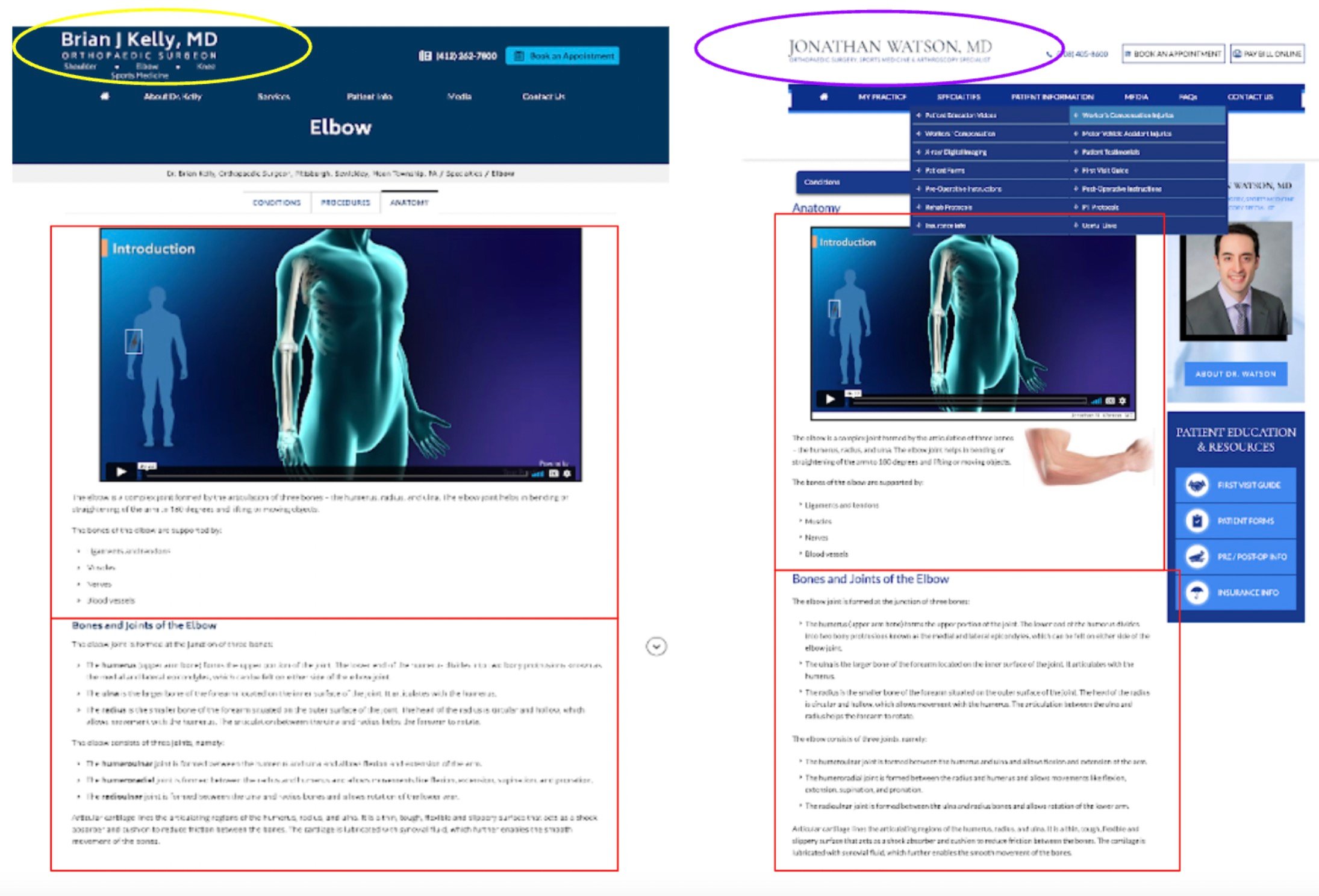
If a practice contains errors or inconsistencies in its on-page SEO, it can severely hurt its ranking in search. That’s why it’s important to make sure that your website is optimized correctly before starting the process of improving your ranking.
An On-Page SEO Audit
At PracticeBeat, we provide an audit of your on-page SEO, as well as a competition audit. Our team will use this data to create a strategy that aims to help your practice acquire more new patients each quarter. With quarterly business reviews and regular communication, you can see progress in real-time.
We have improved the on-page SEO of many practices quarter-over quarter and have garnered impressive results for hundreds of healthcare professionals.
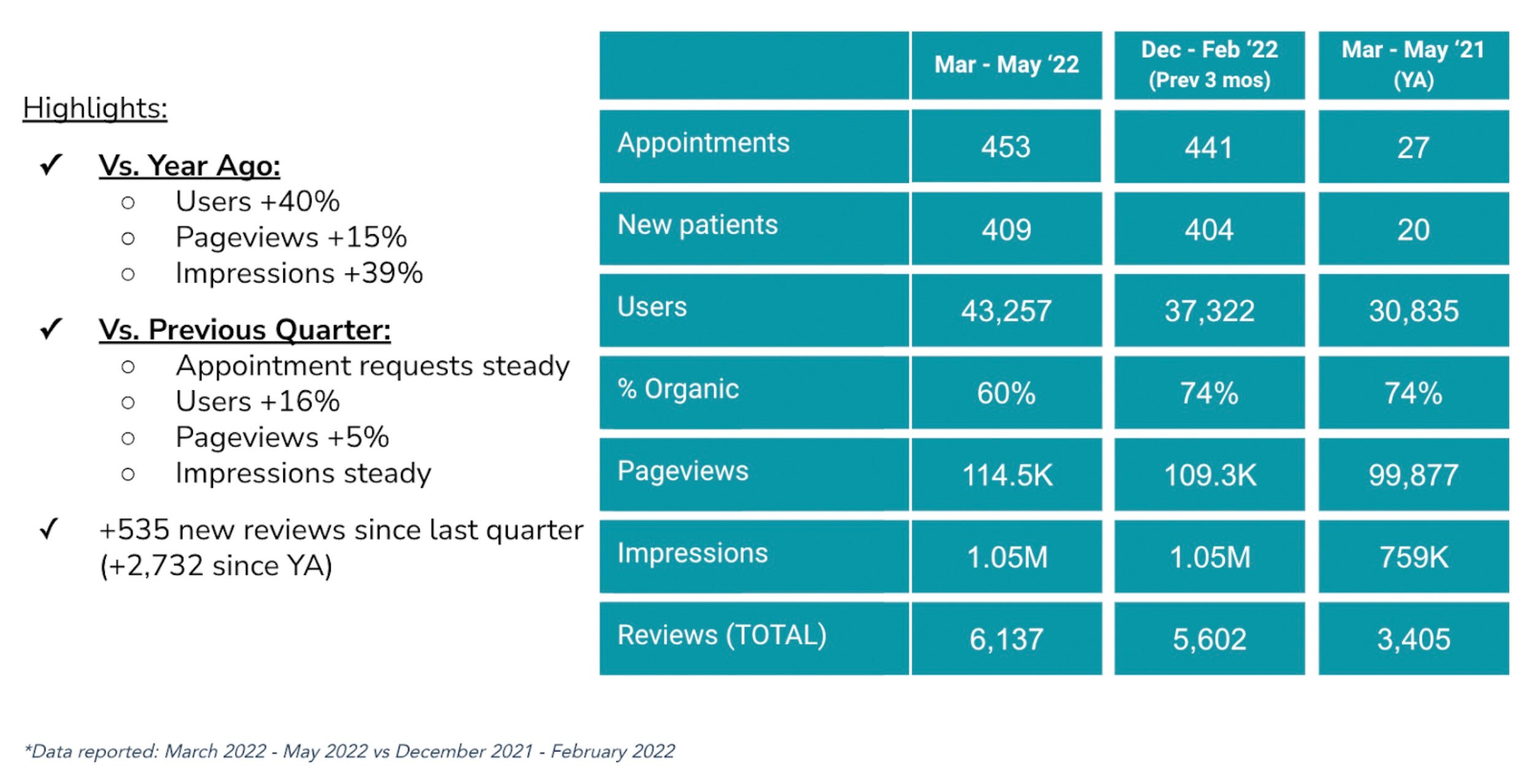
With the experts at PracticeBeat on your side, you can be sure that your website will be well equipped to rank highly in search and continue to acquire patients.
How To Do Keyword Research for SEO
One of the more commonly known aspects of SEO is keyword research. Keyword research is an essential part of any SEO strategy, but there is more that goes into it than people might think.
What is Keyword Research?
Keyword research is the process of finding and selecting keywords to use in an SEO strategy that helps a website rank higher in search. When conducting keyword research, a strategist is looking for keywords that are relevant to the business and have a high search volume. This allows them to understand which keywords potential patients are using to find practices, and how difficult it would be to rank for those set keywords.
Why Is Keyword Research Important?
Keyword research helps a strategist understand which keywords are most relevant to a healthcare practice, and how difficult it would be to rank for those keywords. While it may sound simple, keyword research is a complex process that takes time and expertise. For instance, if a practice is trying to rank for keywords that are too competitive, it could be a waste of time and resources.
Keyword relevancy is important to make sure that the targeted keywords match the ones that potential patients are searching for. If a practice targets keywords that aren't relevant to its field of medicine or geographical location, it likely won't see many applicable results, such as new patients wanting appointments. This applies to search volume as well, because the amount of people who search for certain keywords is equally important. If the search volume is too low, results are unlikely, no matter how relevant the keywords are.
If a practice is not using the right keywords, it could be missing out on potential patients who are searching for practices like them.
How Can A Keyword Research Audit Help?
At PracticeBeat, we provide a comprehensive audit of your website's keyword implementation and create a strategy to help reach the top of the search results page. Identifying competitors and your ability to rank for certain keywords, conducting a gap analysis, and providing new ideas are just a few of the things that we will do to help your practice to rank number one for thousands of keywords and phrases.
We've helped many practices improve their search ranking with our effective strategies and guidance.
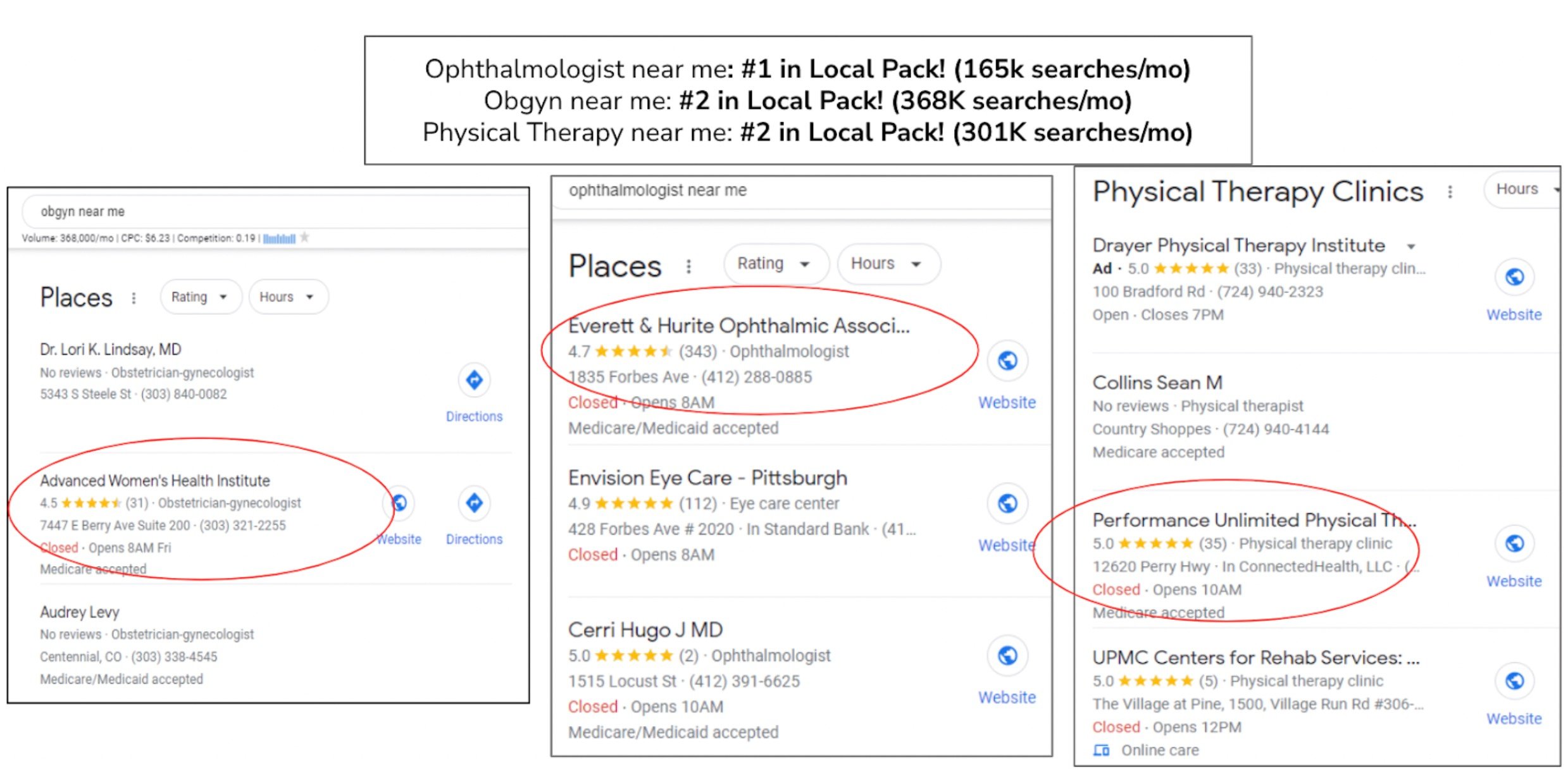
The PracticeBeat experts are experienced in keyword research and can help you identify the best way to grow.
Off-Page SEO: What Is It & How to Use It to Your Advantage
Just like on-page SEO, it is important to ensure that off-page SEO is complete. Off-page SEO is the process of optimizing a website for things that are not directly on the webpage, like building backlinks.
Why Is Off-Page SEO Important?
Off-page SEO is essential to improving a website's authority and visibility in search. The more high-quality links there are pointing to a website, the higher that website will rank. Social media is also a factor in off-page SEO, as it can help to increase a website's reach and get more people talking about your practice.
Off-Page SEO Errors
It's important that off-page SEO is done correctly in order to avoid any penalties from search engines. Some common off-page SEO errors that we see during our audits include:
- Not having enough backlinks - Backlinks are links from other websites that lead to your website. They help to increase the website's authority and can improve ranking in search. If you do not have enough backlinks, it could be affecting your website's visibility.
- Broken links - If there are links on a website that are broken or lead to 404 error pages, this can frustrate users and cause them to leave the site. It can also negatively impact a website's ranking.
- Inconsistent NAP - NAP stands for “Name, Address, and Phone.” It is important to have this information consistent across all platforms, such as on the website, in Google Maps, and on directory listings. If this information is not consistent, it can confuse potential patients and make it difficult for them to get in touch. Google will also take note of this when assigning your site's ranking. Example:
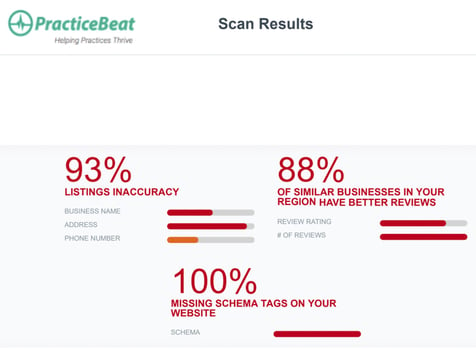
If your practice is making any of these off-page SEO errors, it's important to fix them as soon as possible. The sooner you do, the sooner you can see an improvement in your website's ranking. PracticeBeat will not only help you identify and fix errors but also implement new strategies to further increase your SERP ranking.
An Off-Page SEO Audit
If you are struggling to manage your off-page SEO, let the experts at PracticeBeat help. After an extensive audit, including a competition audit, we will help your practice create a higher domain authority than your competitors.
As shown below, practices can build credibility and increase their online authority with our help:
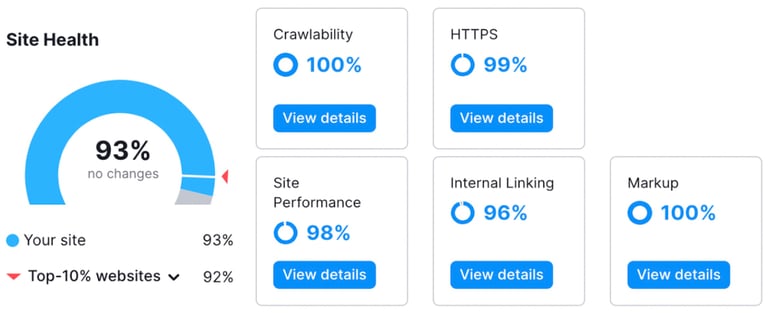
When it comes to SEO, it is imperative that your website performs well in every area. PracticeBeat is here to help you boost your website's ranking and achieve your practice growth goals.
The Ultimate Guide to Technical SEO
Successful search engine optimization requires a variety of strategies to be implemented both on and off the website. To stay ahead of the competition, a practice needs to be constantly learning and evolving its SEO strategy. Technical SEO is one aspect of SEO that is often overlooked, but it's essential for any healthcare practice that wants to rank highly in search.
What Is Technical SEO?
Technical SEO focuses on the backend of a website, ensuring that the website meets all of Google’s requirements. This includes optimizing the website’s structure, code, and site speed. By improving the technical aspects of your website, you can make it easier for Google to crawl and index the site, which will ultimately lead to higher rankings.
Technical SEO Errors You Might Be Making
Without utilizing a proper technical SEO strategy, there are thousands of potential errors that could negatively impact a website’s ranking. Some of the most common technical SEO errors that we find in our audits include:
- Crawl errors - Crawl errors occur when Google is unable to crawl and index a website properly. “Crawling and indexing” means that Google will scan a website and add the pages to its database. If there are crawl errors on your website, it can impact your ranking and visibility on SERPS. These errors can be caused by a number of factors, including broken links, a robots.txt file that is not configured correctly, or a sitemap that is not up to date.
- Not having a sitemap - A sitemap is an XML file that helps Google crawl and index a website. Without a sitemap, Google may not be able to find all of the pages on your site, which could reduce its ranking.
- Page speed errors - Page speed is a ranking factor for Google, which means that if a website is slow, it could impact ranking. There are a number of factors that can contribute to slow page speed, including large images, unoptimized code, and third-party plugins.
- Duplicate content - Duplicate content is any content that appears on a website more than once. If there are multiple pages on a website with the same or similar content, it can be difficult for Google to determine which page is the most relevant. As a result, the website could be penalized, and your ranking could suffer.
- Structure data errors - Structure data, or schema, is code that is added to a website to help Google understand the content on its pages. This can include things like contact information, business hours, and reviews. If this data is not formatted correctly, it could impact ranking.
- Not making the site mobile-friendly - With more and more people using mobile devices to search the internet, it’s important that a website is optimized for mobile. If your website is not mobile-friendly, it could impact ranking.
Technical SEO is vital to a successful digital marketing strategy. To ensure that your website is ranking as high as possible, it’s important to address any technical errors.
How A Technical SEO Audit Can Help
At PracticeBeat, we provide a comprehensive technical SEO audit for every website. We create effective strategies, clear any errors we find, and close the gap between where your site is and where it needs to be. We also provide consistent reporting to track your progress and ensure that your website is always ranking highly. We've helped practices see significant improvement in this area.
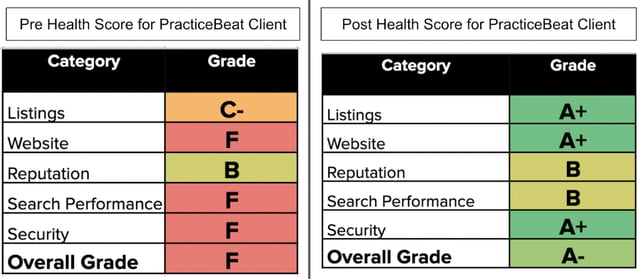
If your site is suffering from poor technical SEO, reach out to the experts at PracticeBeat for an SEO audit that helps your practice consistently rank higher in search and attract new patients.
PracticeBeat: The Solution To Your SEO Struggles
PracticeBeat is an all-in-one practice growth platform that offers a wide range of services to help you grow. At PracticeBeat, we provide practices with comprehensive patient acquisition tools that were previously only available to health systems, all in a single inexpensive platform.
How Can PracticeBeat Improve My Ranking?
When your website is powered by PracticeBeat, you will see ranking, visibility, and reach grow significantly. Our platform offers a wide range of innovative SEO tools to help optimize websites for search. Your website will be fully optimized with technical SEO, unique keyword research, both on-page and off-page SEO, and more. We have helped plenty of clients reach their practice growth goals by consistently bringing in new patients through digital marketing strategies.
What Else Can PracticeBeat Help With?
While SEO is one area where we excel, the efforts don't stop there. Our team of SEO experts, web designers, engineers, content writers, and social media strategists will address every area of your website that has room for improvement. PracticeBeat can help drive traffic and increase patient acquisition through a variety of channels.
Ready to eliminate the barriers that are stalling practice growth and start outranking the competition? Reach out to the experts at PracticeBeat for a free demo.
PracticeBeat digitizes the patient acquisition process and helps practices grow by providing the tools and expertise necessary to outperform the competition. Schedule a free assessment from PracticeBeat to diagnose barriers to practice growth today.


